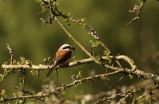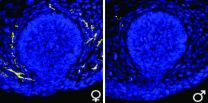(Press-News.org) The catastrophic drought last year in the Horn of Africa affected millions of people but also caused the extremely late arrival into northern Europe of several migratory songbird species, a study from University of Copenhagen published today in Science shows. Details of the migration route was revealed by data collected from small back-packs fitted on birds showing that the delay resulted from an extended stay in the Horn of Africa.
The extensive 2011 drought in the Horn of Africa had significant consequences for European songbirds such as thrush nightingale and red-backed shrike. These birds visit northern Europe every spring to mate and take advantage of ample summer food resources. However, their spring migrating route from southern Africa to northern latitudes passes directly through the Horn of Africa, where the birds stop to feed and refuel for the next stage of their migration.
- Our research was able to couple the birds' delayed arrival in Europe with that stopover in the Horn of Africa. Here they stayed about a week longer in 2011 than in the years before and after 2011. Because of the drought, the birds would have needed longer to feed and gain energy for their onward travel, causing delayed arrival and breeding in Europe. This supports our theory that migrating animals in general are dependent on a series of areas to reach their destination, says Associate Professor Anders Tøttrup from the Center for Macroecology, Evolution and Climate at the University of Copenhagen.
Data loggers as a backpack
The late spring arrival of European songbirds such as thrush nightingale and red-backed shrike perplexed researchers and bird watchers in 2011. This mystery was even greater considering these songbirds' tendency to arrive progressively earlier over the last 50 years as climate change has made its impact. By placing small data loggers on the backs of several birds in the autumn before their migration to Africa, and retrieving them in the spring when the birds returned to Europe, the scientists were able to trace the migration route and stopover sites. These data revealed a delay in the particular stopover in the Horn of Africa. Additionally, it was noted that other migrating birds not passing through the Horn of Africa arrived in Europe at the expected time.
- We have reconstructed 26 migration routes based on data from the small "data backpacks" weighing just 1 gram. This new technology provides us with a detailed picture of the birds' migration and stopovers. It is brand-new territory to be able to track animals this small over such great distances, says Associate Professor Kasper Thorup from the Center for Macroecology, Evolution and Climate at the University of Copenhagen.
Delayed breeding
The birds' late arrival in 2011 also meant a similarly late breeding year.
- There are no signs of implications on the birds' breeding success and thereby the size of the population. But it is possible that we haven't yet seen the full effect of the delayed year, concludes Anders Tøttrup.
INFORMATION:
The research was carried out in collaboration with Lund University in Sweden.
Contact
Associate Professor Anders Tøttrup
University of Copenhagen
E-mail: aptottrup@bio.ku.dk
Mobile: 51 82 69 88
Associate Professor Kasper Thorup
University of Copenhagen
E-mail: KThorup@snm.ku.dk
Mobile: 24 94 25 74
Drought in the Horn of Africa delays migrating birds
2012-12-07
ELSE PRESS RELEASES FROM THIS DATE:
Gene network illuminates stress, mutation and adaptation responses
2012-12-07
HOUSTON – (Dec. 7, 2012) – For much of her professional life, Dr. Susan Rosenberg (www.bcm.edu/genetics/?pmid=11034) has studied the puzzling response of bacteria to stress and the mutations that result. In the current issue of the journal Science (www.sciencemag.org), she puts together the pieces of that puzzle, describing most of the members of an elaborate gene network that functions in causing mutations during repair of double-stranded breaks in the DNA of stressed cells.
"We now know the 93 genes more than half of which are funneling into three nodes that go down ...
World's smallest reaction chamber
2012-12-07
Scientists from New Zealand, Austria and the UK have created the world's smallest reaction chamber, with a mixing volume that can be measured in femtolitres (million billionths of a litre).
Using this minuscule reaction chamber, lead researcher Peter Derrick, professor of chemical physics and physical chemistry and head of the Institute of Fundamental Sciences at Massey University in New Zealand, plans to study the kind of speedy, nanoscale biochemical reactions that take place inside individual cells. This work appears in the latest issue of the European Journal of Mass ...
Cognitive behavioural therapy can reduce depression in those haven't responded to antidepressants
2012-12-07
Antidepressants are the most widely used treatment for people with moderate to severe depression. However, up to two thirds of people with depression don't respond fully to this type of treatment. New findings, published in The Lancet, have shown cognitive behavioural therapy (CBT)*, provided in addition to usual care, can reduce symptoms of depression and help improve patients' quality of life.
This is the first large-scale trial to test the effectiveness of CBT — a type of talking psychotherapy — given in addition to usual care that includes antidepressants. The National ...
New genetic disorder of balance and cognition discovered
2012-12-07
The family of disorders known as ataxia can impair speech, balance and coordination, and have varying levels of severity. Scientists from the Universities of Oxford and Edinburgh have identified a new member of this group of conditions which is connected to 'Lincoln ataxia', so called because it was first found in the relatives of US President Abraham Lincoln. The results are published in the journal PLOS Genetics.
Lincoln ataxia affects the cerebellum, a crucial part of the brain controlling movement and balance. It is caused by an alteration in the gene for 'beta-III ...
Women with higher carotenoid levels have reduced risk of breast cancer
2012-12-07
Women with higher circulating carotenoid levels are at a reduced risk of breast cancer according to a study published December 6 in the Journal of the National Cancer Institute
Carotenoids, which are micronutrients found in fruits and vegetables, have been found to have anticarcinogenic properties. Previous experimental studies have shown that carotenoids inhibit the tumor progression and reduce proliferation of estrogen receptor–positive (ER+) and estrogen receptor–negative (ER-) breast cancers. Despite the inverse association between carotenoids and breast cancer ...
His and hers: Male hormones control differences in mammary gland nerve growth
2012-12-07
Johns Hopkins scientists have found a surprising mechanism that gives male sex hormones like testosterone control over the gender-specific absence or presence of mammary gland nerves that sense the amount of milk available in breast milk ducts.
In a Dec. 7 report on their discovery in Science, they say the hormones do the job by altering the availability of a nerve growth factor, called BDNF for short.
The most obvious differences between males and females involve the presence or absence of physical structures. Below the surface, however, these structures are penetrated ...
USC scientists turn a harmful greenhouse gas into a tool for making pharmaceuticals
2012-12-07
A team of chemists at USC has developed a way to transform a hitherto useless ozone-destroying greenhouse gas that is the byproduct of Teflon manufacture and transform it into reagents for producing pharmaceuticals.
The team will publish their discovery in a paper entitled "Taming of Fluoroform (CF3H): Direct Nucleophilic Trifluoromethylation of Si, B, S and C Centers," in the Dec. 7 issue of Science.
The method is also being patented.
Because of the popularity of Teflon, which is used on everything from cooking pans to armor-piercing bullets, there's no shortage ...
New research investigates how the common 'cat parasite' gets into the brain
2012-12-07
A new study demonstrates for the first time how the Toxoplasma gondii parasite enters the brain to influence its host's behavior. This research was led by researchers from the Karolinska Institute and Uppsala University in Sweden publishes today in the Open Access journal PLOS Pathogens.
The Toxoplasma gondii parasite causes toxoplasmosis. The parasite is common and infects between 30 and 50 per cent of the global population. It also infects animals, especially domestic cats. Human infection is contracted by eating poorly cooked (infected) meat and handling cat feces. ...
Vaginal microbicide gel may offer a promising strategy for prevention and protection against HIV transmission
2012-12-07
A new study shows that a microbicide gel is highly effective in block infection by the AIDS virus in a non-human primate model. In the paper published December 6 in the Open Access journal PLOS Pathogens, Dereuddre-Bosquet and colleagues from the European Combined Highly Active Anti-Retroviral Microbicides (CHAARM) Consortium describe the gel's key ingredient, which are small peptides engineered to present a decoy to bind up the virus and prevent it from entering and infecting the cells of the body. Because this is a gel it can be topically applied and could represent ...
What happens to plant growth when you remove gravity?
2012-12-07
It is well known that plant growth patterns are influenced by a variety of stimuli, gravity being one amongst many. On Earth plant roots exhibit characteristic behaviours called 'waving' and 'skewing', which were thought to be gravity-dependent events. However, Arabidopsis plants grown on the International Space Station (ISS) have proved this theory wrong, according to a study published in BioMed Central's open access journal BMC Plant Biology: root 'waving' and 'skewing' occur in spaceflight plants independently of gravity.
In plant roots, 'waving' consists of a series ...



